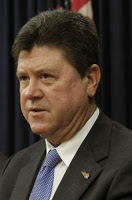Stumbo asks for records pertaining to pain pill tracking efforts; Herald-Leader supports move

 Update, Aug. 29: The Kentucky Board of Medical Licensure may not be tracking the prescribing practices of the state’s doctors, but that’s because it can’t, asserts a past president of the Kentucky Academy of Family Physicians in an op-ed piece in the Lexington Herald-Leader.
Update, Aug. 29: The Kentucky Board of Medical Licensure may not be tracking the prescribing practices of the state’s doctors, but that’s because it can’t, asserts a past president of the Kentucky Academy of Family Physicians in an op-ed piece in the Lexington Herald-Leader.
“Although the board may use KASPER to observe a given physician’s prescribing history for a period of time, it may do that only if provided a name,” Dr. E.C. Seeley writes. “By law, the board may not identify a physician by any means, including KASPER, unless receiving a grievance. Consequently, if the board lacks that capacity, the agency administering KASPER or the legislature should receive the criticism, not the medical board.” (Read more)
House Speaker Greg Stumbo has filed an open records request to find out why the Kentucky Board of Medical Licensure hasn’t been more aggressive in tracking physicians that are over-prescribing pain medication, The Courier-Journal‘s Mike Wynn reports.
The request asks for documents, e-mails, letters and related files that show information on the board’s use of KASPER, the state’s drug-tracking system. “After wanting to make an issue, after wanting help, why did they disband the effort,” said Stumbo, right. “I want to see what they said, what they talked about, what their motives were.”
Stumbo broached the issue with the board Tuesday in a legislative Program Review and Investigation committee meeting. He pointed out the board had shown signs it was interested in pinpointing physicians that were overprescribing medication. In 2003, the licensing board asked to be able to analyze data collected in KASPER. That same year, the legislature passed a law allowing the Cabinet for Health and Family Services, which maintains KASPER, to release geographical data about prescriptions to the board so it could perform its analysis.
But the board’s attorney said Tuesday the data collected is not specific enough and the board doesn’t have the staff to perform the detailed analysis that would be required.
Stumbo suggested the board increase its fees if it needs more staff.
KASPER can produce by-county trend reports, Wynn reports. Though less than 30 percent of the state’s physicians use the system, Stumbo said the data is complete enough to be able to identify suspiciously high prescription rates. (Read more)
In an editorial Thursday, the Lexington Herald-Leader supported Stumbo’s move, saying it’s obvious some Kentucky doctors are over-prescribing. “It’s obvious because Kentucky sees the results daily. Drug overdoses, property crimes, swollen prison populations, crowded court dockets, waiting lists for addiction treatment, ruptured families, etc., etc.,” the editorial reads.
“As Stumbo said, it’s obvious we have a problem,” the editorial reads. “In KASPER it’s also obvious that Kentucky has a tool that could direct investigators to doctors who might be prescribing too many pain pills. It seems equally obvious that using that tool to address a problem that’s destroying lives and costing our state dearly is not only reasonable but essential.” (Read more)